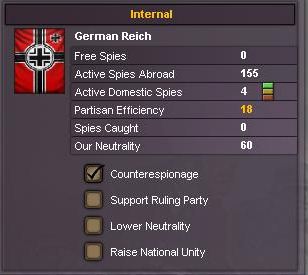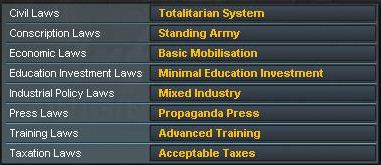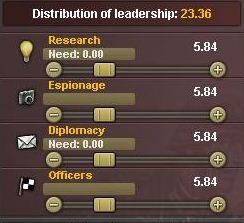GarfunkeL
Racism Expert
Reserved


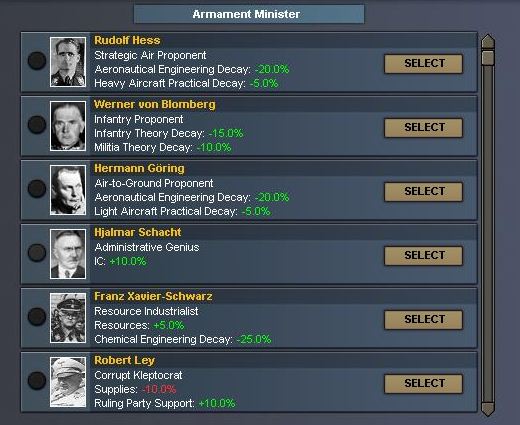


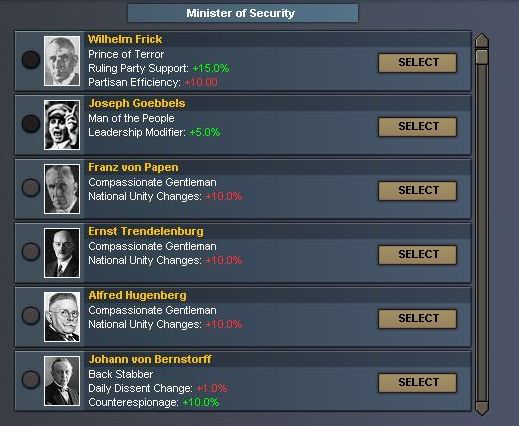

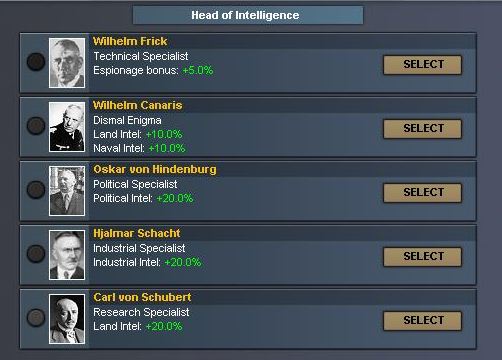

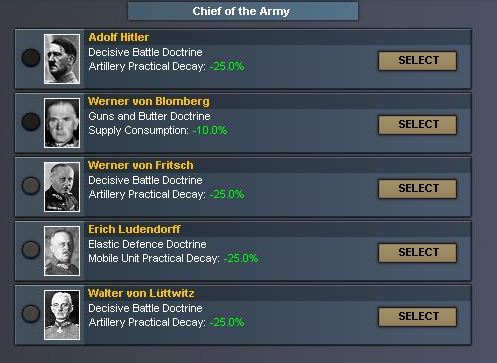
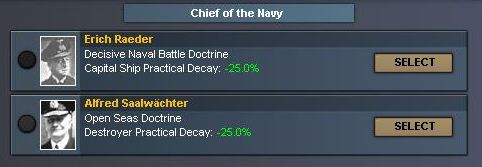


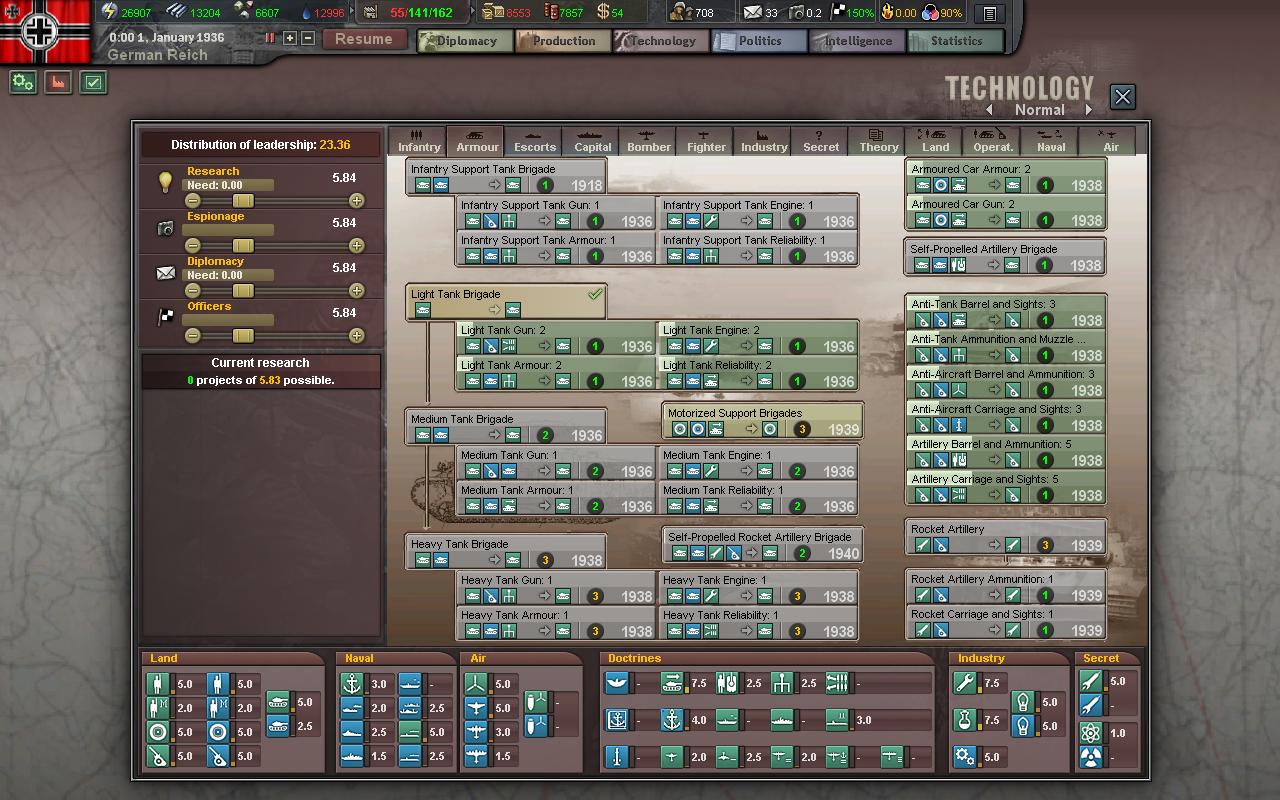
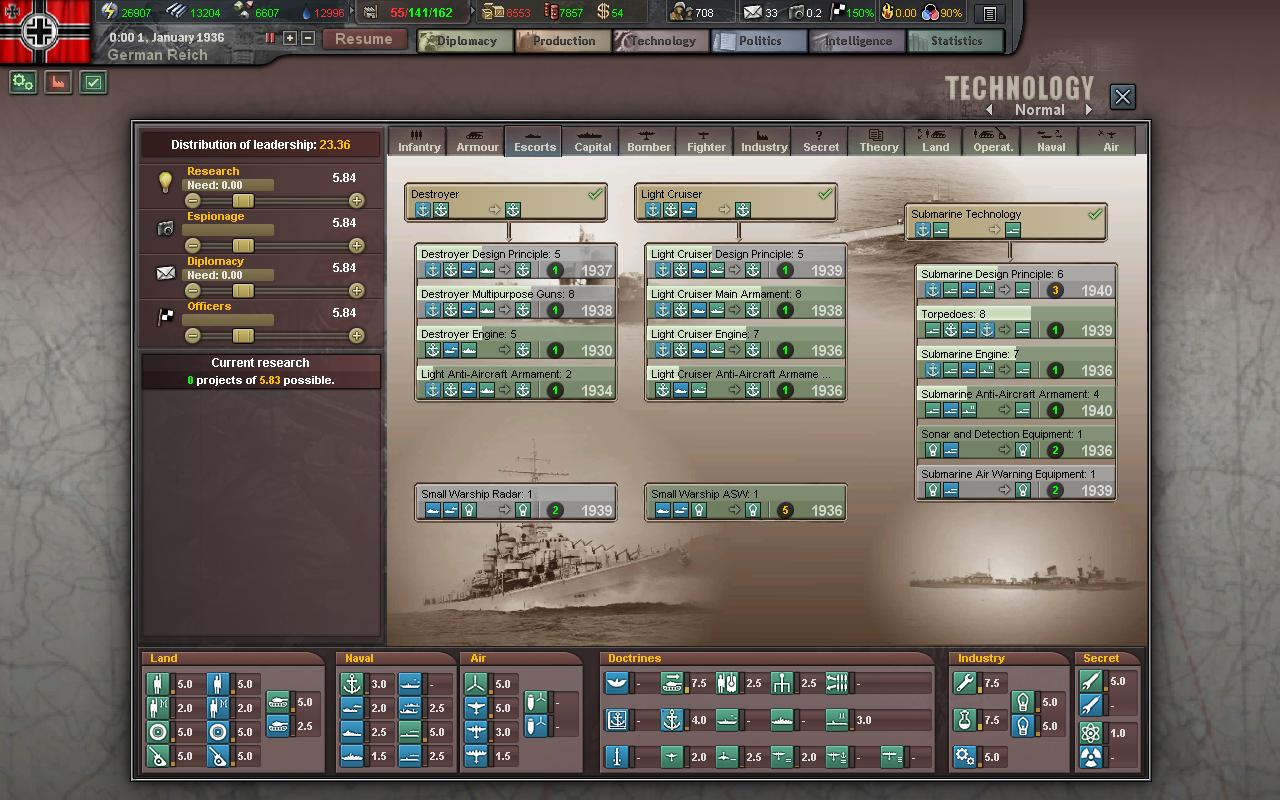
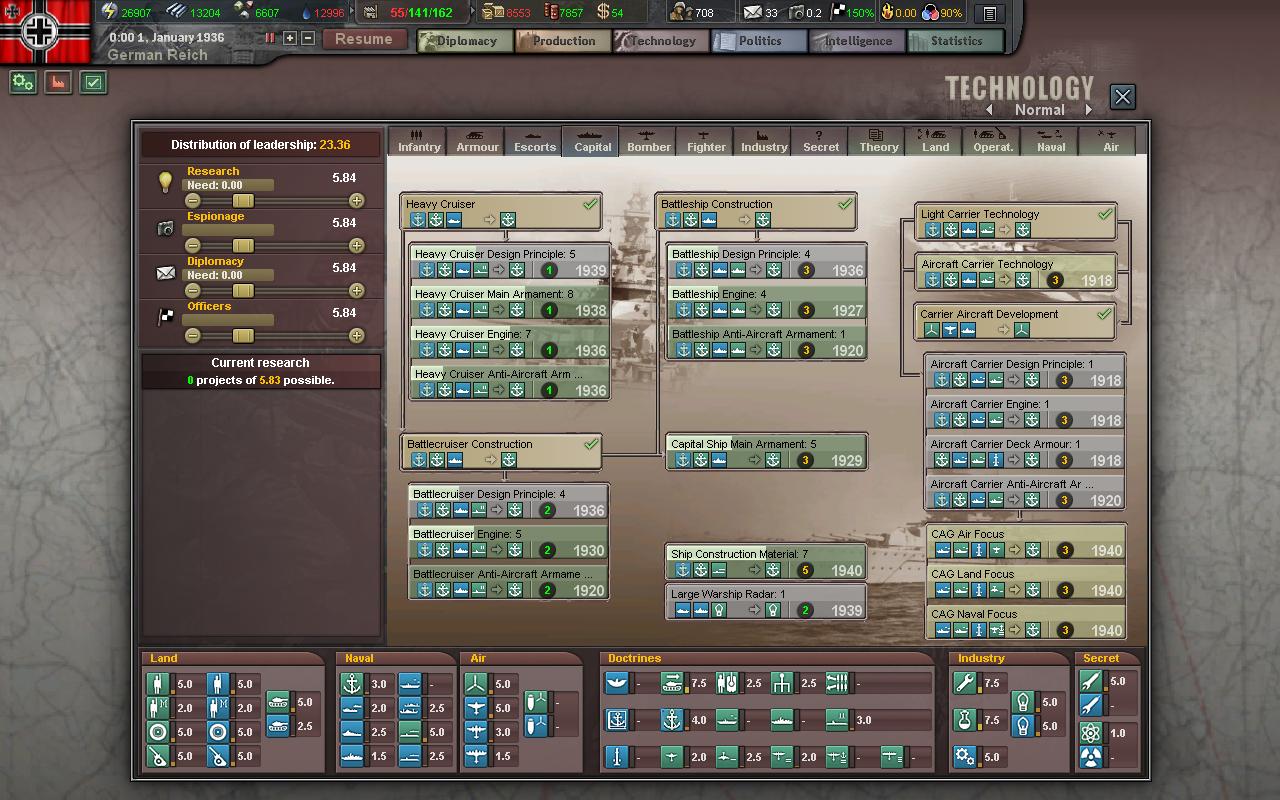


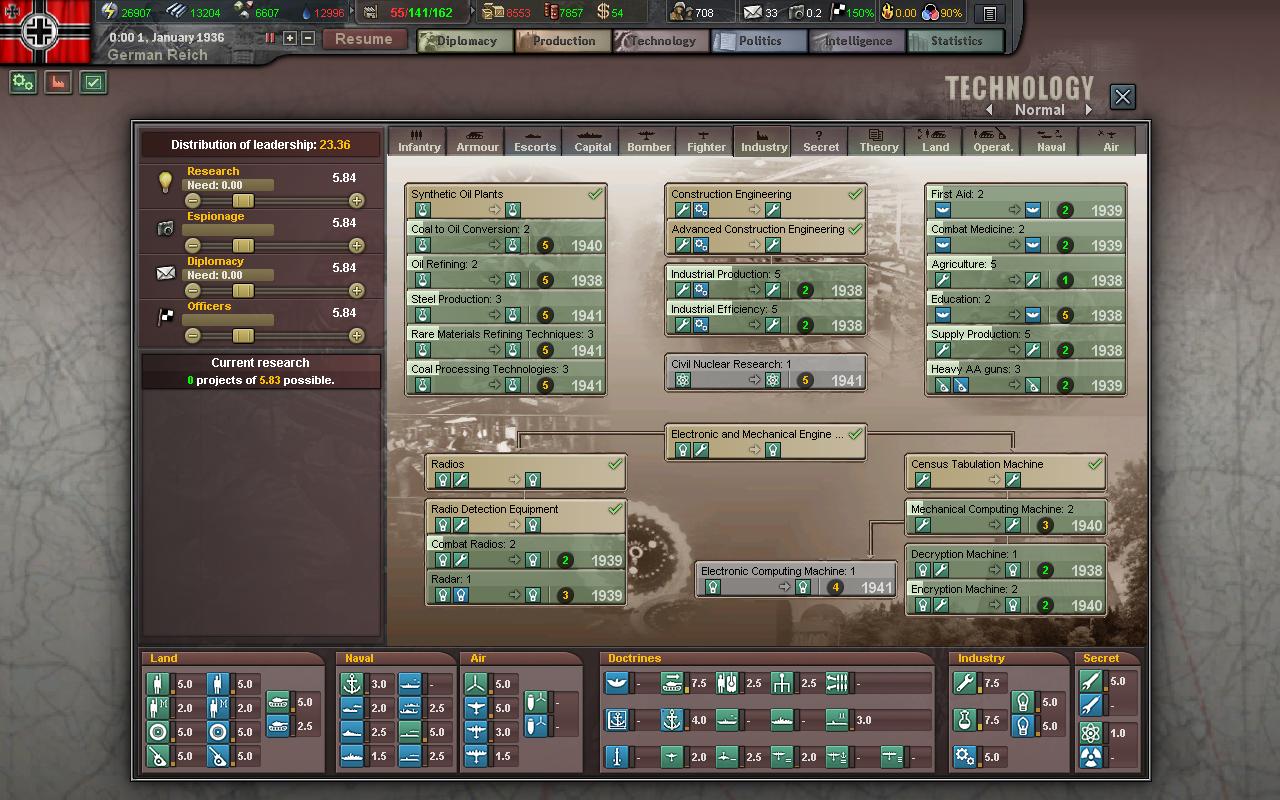



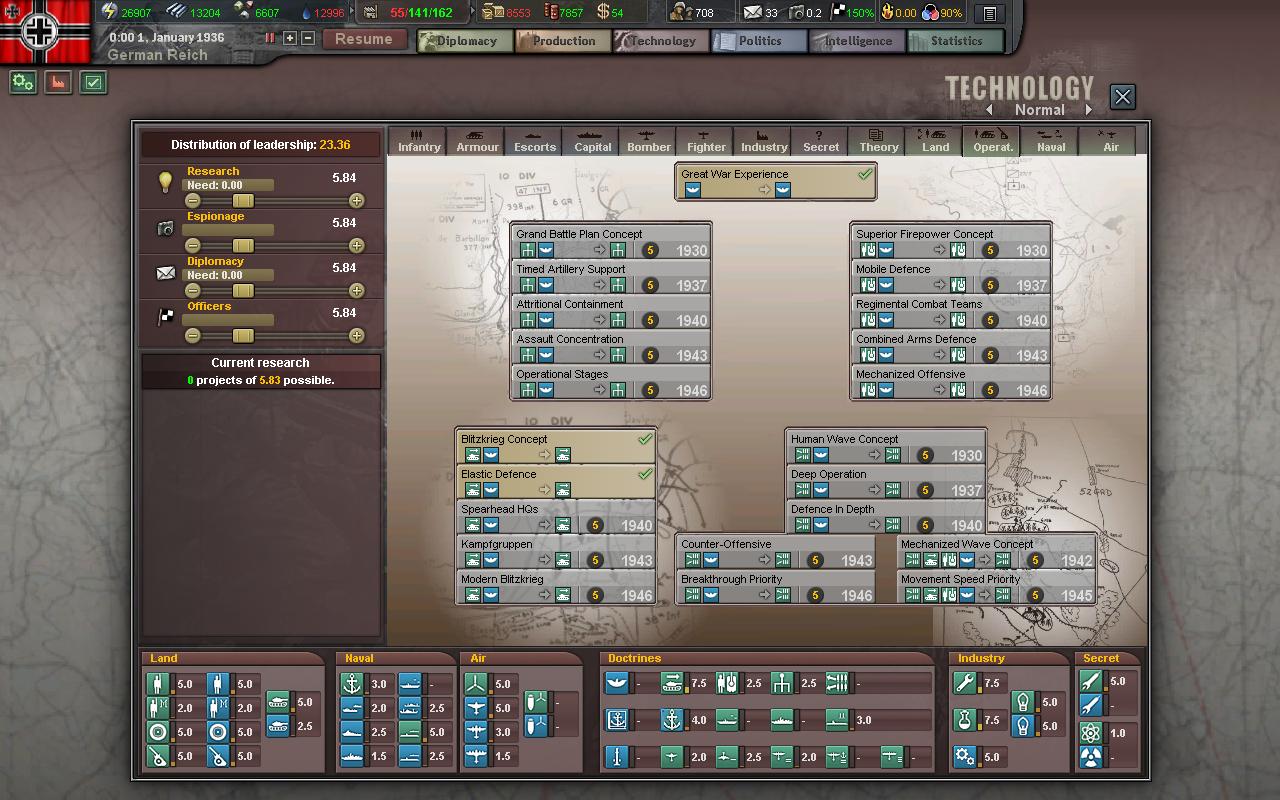







Drakron said:Can you mod the flag?

 for Cassidy and Drakron voting for Ludendorff. Maybe the next Cassidy country LARP will feature the vastly superior HoI3 instead.
for Cassidy and Drakron voting for Ludendorff. Maybe the next Cassidy country LARP will feature the vastly superior HoI3 instead. 

When things go well, not that important - when things go bad, quite a bit.Also, how important are the personalities?

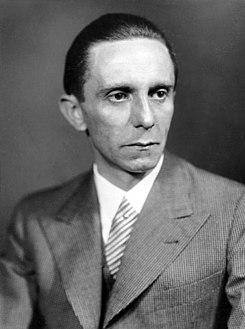
Goebbels earned a Ph.D. from Heidelberg University in 1921, writing his doctoral thesis on 18th century romantic drama; he then went on to work as a journalist and later a bank clerk and caller on the stock exchange. He also wrote novels and plays, but they were rejected by publishers. Goebbels came into contact with the Nazi Party in 1923 during the French occupation of the Ruhr and became a member in 1924. He was appointed Gauleiter (regional party leader) of Berlin. In this position, he put his propaganda skills to full use, combating the local socialist and communist parties with the help of Nazi papers and the paramilitary Stormtroopers, aka, Brownshirts, SA. By 1928, he had risen in the party ranks to become one of its most prominent members.
Goebbels rose to power in 1933 along with Hitler and the Nazi Party and he was appointed Propaganda Minister. One of his first acts was the burning of books rejected by the Nazis. He exerted totalitarian control over the media, arts and information in Germany.
From the beginning of his tenure, Goebbels organized attacks on German Jews, commencing with the one-day boycott of Jewish businessmen, doctors, and lawyers on April 1, 1933. His attacks on the Jewish population culminated in the Kristallnacht assault of 1938, an open and unrestrained pogrom unleashed by the Nazis all across Germany, in which scores of synagogues were burned and hundreds of Jews were assaulted and murdered. Further, he produced a series of anti-Semitic films (most notably Jud Suss). Goebbels used modern propaganda techniques to psychologically prepare the German people for aggressive warfare.

By 1926, Schacht had left the small German Democratic Party, which he had helped found, and was increasingly lending his support to the Nazi Party (NSDAP), to which he became closer between 1930 and 1932. Though never a member of the NSDAP, Schacht helped to raise funds for the party after meeting with Adolf Hitler. Close for a short time to Heinrich Brüning's government, Schacht shifted to the right by entering the Harzburg Front in October 1931.
Schacht's disillusionment with the existing Weimar government did not indicate a particular shift in his overall philosophy, but rather arose primarily out of two issues: first, his objection to the inclusion of Socialist Party elements in the government, and the effect of their various construction and make-work projects on public expenditures and borrowings (and the consequent undermining of the government's anti-inflation efforts); second, on his fundamentally unwavering desire to see Germany retake its place on the international stage, and his recognition that "as the powers became more involved in their own economic problems in 1931 and 1932 ... a strong government based on a broad national movement could use the existing conditions to regain Germany's sovereignty and equality as a world power." Schacht was convinced that if the German government were ever to commence a wholesale reindustrialization and rearmament in spite of the restrictions imposed by Germany's treaty obligations, it would have to be during a period lacking clear international consensus among the Great Powers.
After the July 1932 elections, in which the NSDAP got more than a third of the seats, Schacht and Wilhelm Kepler organized a petition of industrial leaders requesting that President Hindenburg appoint Hitler as Chancellor. After Hitler took power in January 1933, Schacht was re-appointed Reichsbank President on 17 March.
In August 1934 Hitler appointed Schacht as his Minister of Economics. Schacht supported public works programs, most notably the construction of autobahnen (highways) to attempt to alleviate unemployment - policies which had been instituted in Germany by von Schleicher's government in late 1932, and had in turn influenced Roosevelt's policies. He also introduced the 'New Plan', Germany's attempt to achieve economic "autarky", in September 1934. Germany had accrued a massive foreign currency deficit during the Great Depression, which continued into the early years of the Third Reich. Schacht negotiated several trade agreements with countries in South America and southeastern Europe, under which Germany would continue to receive raw materials, but would pay in Reichsmarks. This ensured that the deficit would not get any worse, while allowing the German government to deal with the gap which had already developed. Schacht also found an innovative solution to the problem of the government deficit by using mefo bills. He was appointed General Plenipotentiary for the War Economy in May 1934 and was awarded honorary membership in the NSDAP and the Golden Swastika in January 1937.
Schacht disagreed with what he called "unlawful activities" against Germany's Jewish minority and in August 1935 made a speech denouncing Julius Streicher and Streicher's writing in Der Stürmer.
During the economic crisis of 1935-36, Schacht, together with the Price Commissioner Dr. Carl Friedrich Goerdeler, helped lead the "free-market" faction in the German government. They urged Hitler to reduce military spending, turn away from autarkic and protectionist policies, and reduce state control in the economy. Schacht and Goerdeler were opposed by a faction centering around Hermann Göring.

Like others who were later prominent in the Third Reich, Goebbels came into contact with the Nazi Party in 1923, during the campaign of resistance to the French occupation of the Ruhr. Hitler’s imprisonment following the failed November 1923 "Beer Hall Putsch" left the party temporarily leaderless, and when the 27-year-old Goebbels joined the party in late 1924 the most important influence on his political development was Gregor Strasser, who became Nazi organizer in northern Germany in March 1924. Strasser ("the most able of the leading Nazis" of this period)[18] took the "socialist" component of National Socialism far more seriously than did Hitler and other members of the Bavarian leadership of the party.
"National and socialist! What goes first, and what comes afterwards?" Goebbels asked rhetorically in a debate with Theodor Vahlen, Gauleiter (regional party head) of Pomerania, in the Rhineland party newspaper National-sozialistische Briefe (National-Socialist Letters), of which he was editor, in mid-1925. "With us in the west, there can be no doubt. First socialist redemption, then comes national liberation like a whirlwind… Hitler stands between both opinions, but he is on his way to coming over to us completely." Goebbels, with his journalistic skills, thus soon became a key ally of Strasser in his struggle with the Bavarians over the party program. The conflict was not, so they thought, with Hitler, but with his lieutenants, Rudolf Hess, Julius Streicher and Hermann Esser, who, they said, were mismanaging the party in Hitler’s absence. In 1925, Goebbels published an open letter to "my friends of the left," urging unity between socialists and Nazis against the capitalists. "You and I," he wrote, "we are fighting one another although we are not really enemies."
In February 1926, Hitler, having finished working on Mein Kampf, made a sudden return to party affairs and soon disabused the northerners of any illusions about where he stood. He summoned about 60 gauleiters and other activists, including Goebbels, to a meeting at Bamberg, in Streicher’s Gau of Franconia, where he gave a two-hour speech repudiating the political program of the "socialist" wing of the party. For Hitler, the real enemy of the German people was always the Jews, not the capitalists. Goebbels was bitterly disillusioned. "I feel devastated," he wrote. "What sort of Hitler? A reactionary?" He was horrified by Hitler’s characterization of socialism as "a Jewish creation", his declaration that the Soviet Union must be destroyed, and his assertion that private property would not be expropriated by a Nazi government. "I no longer fully believe in Hitler. That’s the terrible thing: my inner support has been taken away."
Hitler, however, recognized Goebbels’ talents. In April, he brought Goebbels to Munich, sending his own car to meet him at the railway station, and gave him a long private audience. Hitler berated Goebbels over his support for the "socialist" line, but offered to "wipe the slate clean" if Goebbels would now accept his leadership. Goebbels capitulated completely, offering Hitler his total loyalty – a pledge that was clearly sincere, and that he adhered to until the end of his life. "I love him ... He has thought through everything," Goebbels wrote. "Such a sparkling mind can be my leader. I bow to the greater one, the political genius". Later he wrote: "Adolf Hitler, I love you because you are both great and simple at the same time. What one calls a genius." Fest writes:
From this point on he submitted himself, his whole existence, to his attachment to the person of the Führer, consciously eliminating all inhibitions springing from intellect, free will and self-respect. Since this submission was an act less of faith than of insight, it stood firm through all vicissitudes to the end. ‘He who forsakes the Führer withers away,’ he would later write.
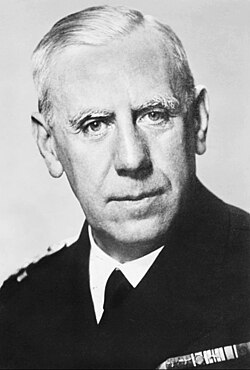
Canaris remained in the military after the war, first as a member of the Freikorps and then as part of the Reichsmarine. He was promoted rapidly, becoming a Captain in 1931, the Executive Officer of the cruiser Berlin and then the Commanding Officer of the battleship Schlesien. At this time, he became involved in intelligence work again. He made a series of contacts with high-ranking German officers, politicians and industrialists for the purpose of creating order in German politics. During his Freikorps period, he was on intimate terms with the people such as Horst von Pflugk-Harttung who were accused of political assassinations of leaders of the left, and was even accused himself, although later acquitted, of being involved in the assassinations and other crimes (such as his alleged involvement in Rosa Luxembourg's "trial"). During the 1930–33 period, Canaris was following a course quite parallel to the one followed by the future Nazi party leaders although never a party member himself. Indirectly, though, he promoted the forces that later became part of the Nazi power structure.
After Adolf Hitler's rise to power in 1933, Canaris was made head of the Abwehr, Germany's official military intelligence agency, on 1 January 1935. Later that year, he was promoted Rear Admiral. During the period 1935–36, he made contacts in Spain to organize a German spy network there, due to his excellent Spanish. He was the moving force behind the decision that sided Germany with Francisco Franco during the Spanish Civil War, despite Hitler's initial hesitation to get involved in such an adventure

Fritz Bayerlein was born in Würzburg, Franconia, Germany. During the First World War, Bayerlein was drafted into the 9th Bavarian Infantry in 1917 and fought on the Western front. He was wounded and received an Iron Cross when he was in the 4th infantry regiment. After the war Bayerlein was briefly a member of a volunteer battalion but was transferred to Regiment 45 in May 1919. He went through officer training in 1921 and was one of the officers who remained in the diminished army. He had reached the rank of major

After graduating in 1907, Blomberg entered the General Staff in 1908. Serving with distinction on the Western Front during World War I, Blomberg was awarded the Pour le Mérite. In 1920, Blomberg was appointed Chief of Staff of the Döberitz Brigade, and in 1921 was made Chief of Staff of the Stuttgart Army Area. In 1925, Blomberg was made Chief of Army Training by General Hans von Seeckt. By 1927, Blomberg was a major-general and Chief of the Troop Office. In 1928, Blomberg visited the Soviet Union, where he was much impressed by the high status of the Red Army, and left a convinced believer in the value of dictatorship as the prerequisite for military power. After arguing with the powerful General Kurt von Schleicher in 1929, however, Blomberg was removed from his post and made military commander of East Prussia. During his time as commander of Wehrkreis I, the military district which comprised East Prussia, Blomberg fell under the influence of a Nazi-sympathizing Lutheran chaplain, Ludwig Müller, who introduced Blomberg to National Socialism. Blomberg cared little for Nazi doctrines per se, his support for the Nazis being motivated by his belief that only a dictatorship could make Germany a great military power, and that the Nazis were the best party to create a dictatorship for Germany. In 1931, Blomberg visited the U.S., where he openly proclaimed his belief in the certainty and the benefits of a Nazi government for Germany. Blomberg's first wife Charlotte died on 11 May 1932 leaving him with two sons and three daughters. In 1932, Blomberg served as part of the German delegation to the World Disarmament Conference in Geneva, where during his time as the German chief military delegate, he not only continued his pro-Nazi remarks to the press, but used his status of chief military delegate to communicate his views to Paul von Hindenburg, whose position as President made him Supreme Commander in Chief.
In late January 1933, Blomberg was recalled from the World Disarmament Conference to return to Berlin by President von Hindenburg, who did so without informing the Chancellor, General von Schleicher or the Army Commander, General Kurt von Hammerstein. Upon learning of this, Schleicher guessed correctly that the order to recall Blomberg to Berlin meant his government was doomed. When Blomberg arrived at the railroad station in Berlin, he was met at by Major von Kuntzen ordering him to report at once to the Defence Ministry on behalf of General von Hammerstein, and by Major Oskar von Hindenburg ordering him to report at once to the Presidential palace. Over Kuntzen's protests, Blomberg chose to go with Hindenburg to meet his father, who swore him in as Defence Minister.
In 1933, Blomberg rose to national prominence when he was appointed Minister of Defense in Adolf Hitler's government. Blomberg became one of Hitler's most devoted followers, and worked feverishly to expand the size and power of the army. In 1933 Blomberg was made a colonel general for his services. In February 1934, acting on his own initiative, Blomberg had all of the Jews serving in the Reichswehr given an automatic and immediate dishonorable discharge. In this way, 74 Jewish soldiers lost their jobs for no other reason than there were Jewish. The Law for the Restoration of the Professional Civil Service had excluded those Jews who were World War I veterans, so Blomberg's discharge order was his way getting arould the law. In 1935, Blomberg worked hard to ensure that the Wehrmacht complied with Nuremberg Laws by preventing so-called Mischling from serving.

After the war, in 1920, Raeder was involved in the failed Kapp Putsch, and after its suppresion he was marginalized in the Navy, being transferred to the Naval Archives, where for two years he studied naval history. Raeder also was the author of a number of studies about naval warfare, something that resulted in his being awarded a Doctor of Philosophy decree honoris causa by the University of Kiel.
After this, Raeder continued to rise steadily in the navy hierarchy, becoming a Konteradmiral (Rear Admiral) in 1922 and a Vizeadmiral (Vice Admiral) in 1925. In October 1928 Raeder was promoted to Admiral and made Commander-in-Chief of the Reichsmarine, the Weimar Republic Navy. Although he generally disliked the Nazi Party, he strongly supported Adolf Hitler's attempt to rebuild the Kriegsmarine, while apparently disagreeing strongly on most other matters. On 20 April 1936, just a few days before Raeder's 60th birthday, Hitler promoted him to Generaladmiral (General Admiral). In his quest to rebuild the German Navy, Raeder faced constant challenges from Hermann Göring's ongoing quest to build up the Luftwaffe.

He remained in flying after the war, worked briefly at Fokker, tried "barnstorming", and in 1921 he joined Svenska Lufttrafik, a Swedish airline. He was also listed on the officer rolls of the Reichswehr, the post–World War I peacetime army of Germany, and by 1933 had risen to the rank of Generalmajor. He was made a Generalleutnant in 1935 and then a General in the Luftwaffe upon its founding later that year.
Göring as a veteran pilot was often hired to fly businessmen and others on private aircraft. He worked in Denmark and Sweden as a commercial pilot. One wintry evening he was hired by Count Eric von Rosen to fly him to his castle from Stockholm. Invited to spend the night there, it may have been here that Göring first saw the swastika emblem, a family badge which was set in the chimney piece around the roaring fire.[
This was also the first time Göring saw his future wife. A great staircase led down into the hall opposite the fireplace. As Göring looked up he saw a woman coming down the staircase as if toward him. He thought she was very beautiful. The count introduced his sister-in-law Baroness Carin von Kantzow (née Freiin von Fock, 1888–1931) to the 27-year-old Göring.
Göring joined the Nazi Party in 1922 and took over leadership of the Sturmabteilung (SA) as the Oberster SA-Führer. After stepping down as SA Commander, he was appointed an SA-Gruppenführer (Lieutenant General) and held this rank on the SA rolls until 1945. Hitler later recalled his early association with Göring thus:
“I liked him. I made him the head of my S.A. He is the only one of its heads that ran the S.A. properly. I gave him a disheveled rabble. In a very short time he had organised a division of 11,000 men.”
At this time, Carin—who liked Hitler—often played hostess to meetings of leading Nazis including her husband, Hitler, Hess, Rosenberg and Röhm.
Göring was with Hitler in the Beer Hall Putsch in Munich on 9 November 1923. He marched beside Hitler at the head of the SA. When the Bavarian police broke up the march with gunfire, Göring was seriously wounded in the groin.
The 1925 psychiatrist's reports claimed Göring to be weak of character, a hysteric and unstable personality, sentimental yet callous, violent when afraid and a person whose bravado hid a basic lack of moral courage. "Like many men capable of great acts of physical courage which verge quite often on desperation, he lacked the finer kind of courage in the conduct of his life which was needed when serious difficulties overcame him."
Göring was one of the key figures in the process of Gleichschaltung ("forcible coordination") that established the Nazi dictatorship. For example, in 1933, Göring banned all Roman Catholic newspapers in Germany, not only to suppress resistance to National Socialism but also to deprive the population of alternative forms of association and means of political communication.


